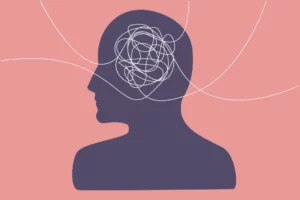Did you know that there is a link between OCD and ADHD? It may seem surprising, but the two conditions often occur together. In this blog post, we will discuss the symptoms of both disorders, as well as how they are related. We will also offer tips for managing both conditions.
Contents
Understanding OCD And ADHD
 Obsessive-compulsive disorder (OCD) and Attention Deficit Hyperactivity Disorder (ADHD) are two distinct mental health conditions. That can both have a significant impact on an individual’s life and functioning. While both OCD and ADHD can cause difficulties with focus and concentration, it is important to recognize the key differences between these conditions.
Obsessive-compulsive disorder (OCD) and Attention Deficit Hyperactivity Disorder (ADHD) are two distinct mental health conditions. That can both have a significant impact on an individual’s life and functioning. While both OCD and ADHD can cause difficulties with focus and concentration, it is important to recognize the key differences between these conditions.
OCD is an anxiety disorder that involves recurrent and persistent thoughts, impulses, or images (referred to as obsessions) that cause significant distress. These intrusive thoughts can lead to compulsions, which are rituals or activities an individual performs in order to reduce the anxiety caused by the obsessions.
And, ADHD is a neurodevelopmental disorder characterized by difficulty with attention, hyperactivity, and impulsivity. Individuals with ADHD may have problems focusing on tasks, staying organized, and completing assignments in a timely manner. They may also be easily distracted or fidgety.
Can You Have ADHD and OCD Together?
As with other mental health disorders, it is possible to have both ADHD and OCD. The two conditions share some overlapping symptoms that can make it difficult to distinguish them from one another. For instance, people with both ADHD and OCD may display disorganization, impulsivity, difficulty focusing, hyperactivity, and trouble controlling their behavior.
There is also research that suggests OCD and ADHD together are more common than previously thought. In fact, studies have shown that people with ADHD are at a greater risk of developing OCD compared to the general population. This could be due to shared genetic factors or environmental influences, such as trauma or stress.
It is important for anyone who has symptoms of both ADHD and OCD to seek professional help for the correct diagnosis. Otherwise, the confusion of symptoms could lead to ineffective treatment. So, be sure to consult with a professional for a healthier life.
Link Between OCD And ADHD
Both OCD and ADHD are believed to share some common genetic and neurobiological pathways.
These pathways may include dopamine, serotonin, glutamate, and norepinephrine. Studies suggest that individuals who have ADHD are more likely to develop the obsessive-compulsive disorder than those without the condition.
In addition, some studies suggest a link between childhood OCD and the later development of attention deficit hyperactivity disorder in adulthood. This link has been found especially in those with severe OCD symptoms and co-occurring anxiety disorders.
The exact relationship between OCD and ADHD is not fully understood. But it appears that having both conditions may mean a more complex form of treatment. Cognitive Behavioral Therapy (CBT) is the most commonly used form of therapy for individuals with OCD and ADHD together. However, you should speak to your mental health provider about other treatment options.
Can ADHD Make OCD Worse?
 If a child or adult has both Attention Deficit Hyperactivity Disorder (ADHD) and Obsessive Compulsive Disorder (OCD), the two conditions can interact in a number of ways. That can make one or both of them worse.
If a child or adult has both Attention Deficit Hyperactivity Disorder (ADHD) and Obsessive Compulsive Disorder (OCD), the two conditions can interact in a number of ways. That can make one or both of them worse.
For example, if someone with ADHD is unable to focus and concentrate on completing tasks related to OCD. Then, they may become overwhelmed and anxious as they struggle to complete them. This can lead to an increase in OCD symptoms as well as a decrease in their ability to manage and control their ADHD.
Also, someone with both conditions may be more prone to engaging in compulsive behaviors that are related to ADHD—such as fidgeting or impulsivity—which could exacerbate their OCD symptoms.
Lastly, individuals with both conditions may be more likely to become easily frustrated and experience frequent mood swings. This could further exacerbate the symptoms of OCD as they struggle to maintain control over their emotions.
Diagnosis To Differentiate
If a person has signs and symptoms of both OCD and ADHD, doctors may need to do further testing to differentiate between the two. Some of these tests include:
- Psychological evaluations
- Brain imaging with an MRI or CT scan
A doctor may also look at family history, medications, or environmental stressors that could contribute to either condition. Differentiating between OCD and ADHD can be difficult, but with the right testing, doctors can make an accurate diagnosis.
Do not forget that though the similarities between OCD and ADHD can be confusing for some, they are separate conditions. Both with different causes, treatments, and outcomes. It is important to seek professional help if you or a loved one is struggling with symptoms of either condition. With proper diagnosis and treatment, both conditions can be managed effectively.
Tips To Manage Both OCD And ADHD Together
 This might sound like a daunting task, but with proper planning and guidance, it is possible to manage both OCD and ADHD. Here are some tips that can help:
This might sound like a daunting task, but with proper planning and guidance, it is possible to manage both OCD and ADHD. Here are some tips that can help:
1. Make sure to get enough sleep every night. This will help keep your energy levels up throughout the day so that you can focus better and be more productive.
2. Eat a healthy diet that is rich in nutrients, vitamins, and minerals. This will help to fuel your body and mind so you can stay focused on tasks.
3. Exercise regularly to boost your energy levels throughout the day. It’s also important to keep in mind that exercise may have additional benefits for people with both OCD and ADHD as it can help reduce stress and anxiety.
4. Establish a routine for yourself and stick to it. This will help keep things organized and on track so that you don’t become overwhelmed or forget important tasks.
5. Get the proper diagnosis from your doctor so that you can develop an individualized treatment plan that takes both disorders into account.
6. Allow yourself to take breaks during the day and don’t be too hard on yourself if you can’t complete a task in one sitting. It may take longer to complete, but it is important to remember that you are taking care of two conditions at once.
7. Seek support from friends, family, and professionals. This can be a great source of encouragement and help when it comes to managing these two disorders together.
8. Gather information about both OCD and ADHD so that you can better understand how they work together in order to effectively manage them.
9. Finally, stay positive! Even though managing OCD and ADHD together can be difficult, it is possible with the right guidance and treatment. Don’t give up!
By following these tips, you will be able to better manage both OCD and ADHD together. It may take some time to get used to managing both conditions at once. But with patience and dedication, it is possible to lead a happy and productive life.
Conclusion
In conclusion, OCD and ADHD together can be an overwhelming combination, but with the right resources, support, and guidance it can be managed. It is important to understand both conditions in order to develop a comprehensive treatment plan that works for you.
While OCD and ADHD may have some overlapping characteristics and may affect someone in similar ways. It is still critical to recognize each disorder as unique and to treat them accordingly.
For more information and guidance, please contact MantraCare. OCD is a mental health disorder characterized by obsessions and compulsions. If you have any queries regarding Online OCD Counseling experienced therapists at MantraCare can help: Book a trial OCD therapy session


